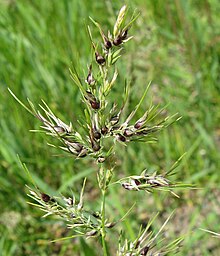
Back تكاثر لاإخصابي Arabic Apomiksis AZ Apomixi Catalan Apomixie Czech Apomixis Danish Apomixis German Apomixis Spanish Apomiksis ET نامیختگی FA Apomiksia Finnish

In botany, apomixis is asexual development of seed or embryo without fertilization. However, other definitions include replacement of the seed by a plantlet or replacement of the flower by bulbils.
Apomictically produced offspring are genetically identical to the parent plant, except in nonrecurrent apomixis. Its etymology is Greek for "away from" + "mixing".
Normal asexual reproduction of plants, such as propagation from cuttings or leaves, has never been considered to be apomixis. In contrast to parthenocarpy, which involves seedless fruit formation without fertilization, apomictic fruits have viable seeds containing a proper embryo, with asexual origin.
In flowering plants, the term "apomixis" is used in a restricted sense to mean agamospermy, i.e. clonal reproduction through seeds. Although agamospermy could theoretically occur in gymnosperms, it appears to be absent in that group.[1]
Apogamy is a related term that has had various meanings over time. In plants with independent gametophytes (notably ferns), the term is still used interchangeably with "apomixis", and both refer to the formation of sporophytes by parthenogenesis of gametophyte cells.
Male apomixis (paternal apomixis) involves replacement of the genetic material of an egg by the genetic material of the pollen.
Some authors included all forms of asexual reproduction within apomixis, but that generalization of the term has since died out.[1]
- ^ a b Bicknell, Ross A.; Koltunow, Anna M. (2004). "Understanding Apomixis: Recent Advances and Remaining Conundrums". The Plant Cell. 16 (suppl 1): S228–S245. doi:10.1105/tpc.017921. PMC 2643386. PMID 15131250.